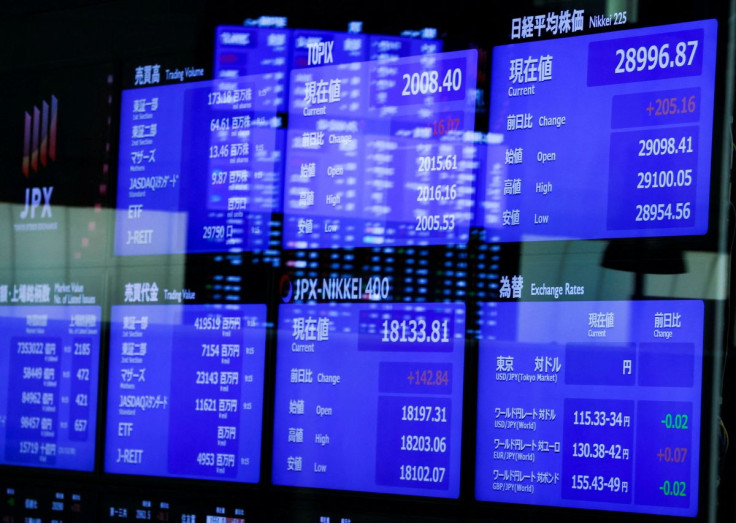Stocks Creep Up, Await Proof Of Ukraine De-escalation

World stocks crept higher on Wednesday for the second day in a row and safe-haven assets such as government bonds lost ground, though market moves were checked by Western scepticism that Russia had indeed pulled back troops from Ukraine's borders.
Markets are looking for any sign that one of the deepest crises in East-West relations for decades is starting to ebb and have seized on Moscow's announcement of a partial pullback, even while U.S. President Joe Biden warned there was no proof.
MSCI's global equity index rose 0.4%, following Tuesday's 1.3% bounce, which snapped a three-day losing streak.
However, sharp gains seen on Asian equity markets earlier on Wednesday faded in the European session, with the STOXX 600 pan-European equity index ceding an early rise to stand flat by 1200 GMT.
Wall Street too is now indicated to open flat as traders await the release of minutes from the Federal Reserve's last meeting and a raft of U.S. economic data.
"The surprise element is gone, the market has already priced in a certain deterioration in the situation," said Peter Kinsella, head of FX at Swiss private bank UBP.
"Given where oil is trading, the rouble should be at 65-66 against the dollar so an awful lot is priced in and the same is true of equities in Europe," Kinsella said, estimating that gold too was trading with a $100 premium to current fair value.
The rouble rose modestly to 75 per dollar after strengthening 1.3% on Tuesday.
But while immediate war fears waned - Russia published video that it said showed tanks and military vehicles leaving annexed Crimea - tensions remain high.
Ukraine hinted Russia was behind a series of cyber attacks on Tuesday and Russia's parliament urged the government to recognise two breakaway Ukrainian regions as independent.
All that would keep markets jittery, said Chris Weston, head of research at brokerage Pepperstone in Melbourne.
"News flow can still shift rapidly, and I suspect there'll be more twists and turns that suggest geopolitical hedges - long crude, gold, volatility, and short risk - can make a comeback," Weston said.
Gold, which on Tuesday hit the highest level since June last year at around $1,879 per ounce, is now around $1,852 [GOL/]. Brent crude rose $1 a barrel but stayed off seven-year highs hit on Monday [O/R]
With geopolitical tensions easing, focus may grow on inflation readings amid speculation the U.S. Federal Reserve and its peers may go faster and bigger with interest rate rises.
UK data showed consumer prices increased at the fastest annual pace in nearly 30 years, reinforcing chances the Bank of England will raises rates for a third meeting in a row.
A day earlier, U.S. data showed core factory gate inflation - producers' costs after stripping out food and energy - posting its biggest gain in a year.
It gave credence to those calling for a half-point rate increase by the Fed in March, something markets may get more clarity on when the Fed minutes emerge.
A Reuters survey of economists leant towards a 25 basis point (bp) hike, but a quarter of those polled said a half-point move was likely.
The prospect of front-loaded, aggressive rate hikes has dramatically flattened government bond curves, with the gap between two-year and 10-year UK bond yields a short way off turning negative - the so-called inversion that often portends an economic slump.
The yield on 10-year Treasuries was last at 2.036%. The two-year yield, which goes up with expectations of higher Fed fund rates, was at 1.568%.
Earlier this week, the Treasury yield curve hit its flattest levels since mid-2020 but has since steepened back to around 47 bps as ebbing war fears lifted 10-year yields.
For some, the state of the curves shows central banks have fallen behind in their inflation fight and must act swiftly with policy tightening.
Kinsella said a 50 bps Fed move would be "a pretty big deal" but reckoned it was doable, given where inflation is.
Besides the Fed minutes, investors are also awaiting U.S. data that is expected to show a 2% jump in retail sales in January.
On currency markets, the dollar index shed some of its geo-political premium and slipped 0.2% to 95.8, pulling back from recent two-week highs. [FRX/]
© Copyright Thomson Reuters 2024. All rights reserved.







